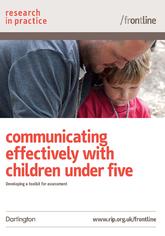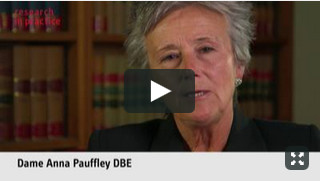 Contents
Contents
Working with extended families
- video: the Judiciary discusses working with families
- links to practical tools for practitioners
- links to relevant research, reviews and reports on the topic
Test your knowledge:
– e-learning materials for this topic
What you need to know
Many families are angry, frightened or distrustful when first involved in child protection proceedings. Parents may be perceived to be resistant as a result of fear, shame or a lack of understanding. Parents’ fears can be heightened by negative media portrayals of social workers ‘snatching children’ or previous experiences with social workers, either themselves or in their family.
Time spent talking to parents early on in the work – explaining the social work role, answering their questions and acknowledging their anxiety, is an important part of building a respectful working relationship. When working in the context of child protection, this has to be balanced with a level of ‘respectful cynicism’ – the recognition that, whilst this is by no means universally true, some abusive families may set out to deceive, manipulate or intimidate workers in order to avoid discovery. Children and parents need reassurance about the limits of social work power and the purpose of visits and meetings. Providing leaflets and information about organisations such as the Family Rights Group can help family members to understand the process and participate.
In order to find the right balance between safeguarding the child and supporting the family, it is important to use simple, straightforward language to explain what the problems are and what parents need to do about them. This is particularly important when parents have learning difficulties, poor literacy or do not speak English as a first language.
When working with children and families it is important to:
- ensure assessments document the child’s story and in clear language
- include a clear list of tasks, with timescales, when constructing plans
- share aims and intended outcomes with children and families face to face and in a timely way (consider the involvement of an advocate or identify, with the child, which member of the professional network might be an effective voice for them).
A number of different approaches are being implemented to work with families, including: restorative practices, family goup conferences, signs of safety, among others.
Getting independent information and advice can be a means of enabling parental participation. See the Learning resources section for details.
Working with men
- Many men are both risk and resource for children
- Non-resident fathers are particularly likely to be excluded and a proactive approach is often needed in order to ensure that they are aware of the concerns regarding their child, involved in meetings (when appropriate) and properly assessed as potential carers. Practice skills based on approaches such as motivational interviewing can facilitate engagement
- The father is often the gateway to the paternal extended family who may also be an important resource for the child
- Men are disproportionately responsible for family violence and sexual abuse, but social work intervention typically focuses on mothers
- Failure to assess and engage with risky men leaves children at risk and may increase the risk to women (who are left with the responsibility of explaining a child protection intervention to a violent partner)
- Children in the child protection system often live in complex, transient families. It is vital to identify all of the men involved in children’s lives and gather information about them
- Men often live with a number of different families over time; information about them may be held in several different children’s files or by Cafcass as a result of private law proceedings
- It is essential to obtain information relating to criminal history, violence within and outside the home, mental health and substance misuse when assessing risk of family violence
- Non-biological father figures and ‘peripheral men’ (those in short term relationships with children’s mothers) are over-represented in serious case reviews and often invisible to child protection services.
Family Rights Group provide some useful resources for practitioners working with fathers – there is also a FAQ section for fathers on their website. Further tools for working with fathers of infants can be found in the NSPCC website.
Working with children
 Frontline: Communicating Effectively with Children Under Five
Frontline: Communicating Effectively with Children Under FiveA practical tool to help professionals communicate with children under five is available to download.
- Listening to children should not solely rely on verbal communication. Observation, play, drawing and understanding of the child’s development, behaviour, demeanour and response to the important people in their lives is central to understanding how they experience life in their family. This is particularly important for those children who do not use speech because of their age or disability
- Direct work is not an additional luxury, it is central to protecting children at every stage of the process. Playing with children in the park is real social work, helping professionals to begin to imagine themselves in the child’s shoes. This is essential for effective child protection
- Workers who need to explain decision making processes and potential moves need access to a range of toys and stories so that they can show, as well as tell, children what is happening
- For social workers to ensure that every child is ‘seen and spoken to’, they need to negotiate with the child’s carer and help them understand what role they are expected to play during this visit. Opportunities should be available to see the child with and without the parent/carer present
- Attending to children who have experienced abuse and neglect and who are in profound distress is emotionally demanding. Good supervision is essential in ensuring that workers are able to tolerate remaining open to these experiences without becoming desensitised or overwhelmed
- Children want to be involved in the child protection process, even when this is difficult. They want to be listened to, but do not expect to make the final decisions. They want workers to explain what is happening and why
- Advocacy can help children to participate. Attending meetings and participating are not always the same thing.
Working with extended families
- All work with families should consider the degree to which extended family and friendship networks may be able to support the parents’ care of their child
- Family group conferencing can help to identify and galvanise the strengths within extended family networks and keep children safe. Family group conferences should be part of early work with families and for information gathering
- If children cannot remain with their birth parents, the local authority has a duty to consider placement with family or friends (under s22C of the Children Act 1989).
For more information on family and friends care see Pre-proceedings: family and friends placement.
Learning resources
 Working with families – Dame Justice Anna Pauffley
Working with families – Dame Justice Anna Pauffley
Running time: 02:05
Download video direct from Vimeo
Also viewable online via Adobe Connect
(having trouble playing our videos?)
Family Rights Group has on-line resource for parents and family members. See below for more information. The site also contains information regarding Family Group Conferences.
SCIE has a series of tools on communication skills for social workers
The Fostering and Adoption Resources has sections on working with birth parents and communicating with children, providing key messages and exercises for developing practice.
More information on conducting evidence based and analytical assessments, including those done for early help, can be found in the section on Assessments in this website.
Resources for parents
The Coram Children’s Legal Centre Child Law Advice Line provides free legal advice and information on all aspects family, child and education law affecting children and families.
Resources from the Family Rights Group for families, carers and professionals
Family Rights Group is a charity in England and Wales that advises families whose children are involved with or need children’s services because of welfare needs or concerns.
Resources for parents and families and friends
26 Advice Sheets contain detailed information for families: they can all be found at the Family Rights Group as downloadable PDF’s.
Relevant advice sheets include the following:
There is also information on parental advocacy.
All parents can get (and give) support to others’ in similar situations by visiting FRG’s discussion forum for parents.
An advisor is available for more in-depth conversation at FRG’s advice line 0808 801 0366, opening hours Monday – Friday 9.30am – 3.00pm excluding Bank Holidays.
Video
Family Rights Group has produced films for families to help ‘demystify’ the child welfare system.
- Go to the relevant films to view fictionalised cases which show what happens when a child protection conference is held and similarly when a family group conference takes place
- There are also filmed interviews with professionals about their role in the child protection process and with family members and FGC coordinators about their experience of a family group conference
- These films can be used as preparation for participating in a family group conference.
For detailed information about the family group conference process see: family group conference advice sheet.
Independent advocacy and advice
FRG provides independent advocacy and parents/carers can commission advocacy from FRG.
Further reading
The following resources provide evidence and practice examples of how to engage and work with challenging, complex and vulnerable families:
- Crowther K and Cowen G (2011) Effective Relationships with Vulnerable Parents to Improve Outcomes for Children and Young People. London: Action for Children
- Farmer E and Lutman E (2012) Effective Working with Neglected Children and their Families. Jessica Kingsley Publishers
- Fauth R, Jelicic H, Hart D, Burton S and Shemmings D (2010) Effective practice to protect children living in ‘highly resistant’ families. London: C4EO
- Featherstone B and Fraser C (2012) ”I’m just a mother. I’m nothing special, they’re all professionals’: parental advocacy as an aid to parental engagement’. Child and Family Social Work 17(2) 244-253
- Forrester D, Kershaw S, Moss H and Hughes L (2008) ‘Communication skills in child protection: how do social workers talk to parents?’ Child and Family Social Work 13(1) 41-51
- Forrester D, Westlake D and Glynn G (2012) ‘Parental resistance and social worker skills: towards a theory of motivational social work’. Child and Family Social Work 17(2) 118-129
- Mason C (2012) ‘Social work and the “art of relationship”: parents’ perspectives on an intensive family support project’. Child and Family Social Work 17(3) 368-377
- National Quality Improvement Network (2010) Principles for engaging with families. London: NCB
- Ofsted (2011) The voice of the child: learning lessons from serious case reviews. Manchester
- Ofsted (2012) Working with families through the ‘LIFE’ programme- Swindon Borough Council. Manchester: Ofsted
- Reder P, Duncan S and Gray M (1993) Beyond blame. Routledge: London
- Shaheed F (2012) Engaging resistant, challenging and complex families. Dartington: Research in Practice
- Shemmings D, Shemmings Y and Cook A (2012) ‘Gaining the trust of ‘highly resistant’ families: insights from attachment theory and research’. Child and Family Social Work 17(2) 130-137
- Thoburn J (2009) Effective interventions for complex families where there are concerns about, or evidence of, a child suffering significant harm. London: C4EO
- Turney D (2012) ‘A relationship-based approach to engaging involuntary clients: the contribution of recognition theory’. Child and Family Social Work 17(2) 149-159
- Watson J (2011) ‘Resistance is futile? Exploring the potential of motivational interviewing’. Journal of Social Work Practice: Psychotherapeutic Approaches in Health, Welfare and the Community 25(4) 465-479
Also see Brandon M ET AL series of research reports on serious case reviews published by the Department for Education, for further information on risk factors. These are available from University of East Anglia
Triennial Analysis of SCRs: Briefing for social workers and family support workers
The following resources on motivational interviewing may be useful:
- The Australian Government : The application of motivational interviewing techniques for engaging “resistant” families
- Hohman M (2012) Motivational Interviewing in Social Work Practice. New York: Guilford Press
- Forrester D and Harwin J (2011) Motivational Interviewing and Effective Work with Families in which Parents Misuse Drugs and/or Alcohol Effective Interventions in Social Work and Child Protection, John Wiley & Sons, Ltd, Chichester, UK
The following resources consider how to engage and work with fathers:
- Maxwell N, Scourfield J, Featherstone B, Holland S and Tolman R (2012) ‘Engaging fathers in child welfare services: a narrative review of recent research evidence’. Child and Family Social Work 17(2) 160-169
- Scourfield J, Maxwel N, Holland S, Tolman R, Sloan L, Featherstone B and Bullock A (2013) Improving the engagement of fathers in child protection. National Institute for Social Care and Health Research
Test your knowledge
These exercises aim to help you embed knowledge in this area. A range of different formats have been used, and most can be used individually or in team learning. Discussing your learning with your supervisor will help to ensure it informs your practice.
Partnership working with families during assessment
This is a reflection tool for your practice designed to ensure children and families can participate fully in the assessment process and that their views have been taken into account.
You may also want to use this check list as a starting point for obtaining feedback from families on your assessment.
![]() Download the exercise as a Word .DOC file:
Download the exercise as a Word .DOC file:
Partnership working with families during assessment_040714
or
![]() Download the checklist as a .PDF file:
Download the checklist as a .PDF file:
Partnership working with families during assessment_040714






